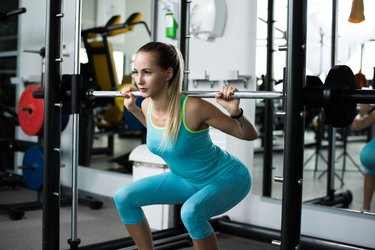
Lifting heavy weights is not inherently dangerous, as long as you are lifting an appropriate weight for your health and strength and you use correct lifting technique.
Although people who are pregnant should generally avoid lifting heavy weights, you can train over time to lift heavy weights without injury. You should seek advice from a fitness professional in starting a weightlifting schedule, and ask your doctor whether you have any health issues that could make weight lifting dangerous for you.
Video of the Day
Video of the Day
Benefits
Lifting can help women add muscle mass, leading to a higher metabolism and help to prevent weight gain. It's also critical for women who are trying to lose weight since it prevents muscle loss and ensures the weight you do lose is fat. There are many benefits of safe, appropriate weightlifting for healthy women who are not pregnant.
Lifting weights at a comfortable level that does not cause you pain or discomfort is beneficial in terms of promoting bone and skeletal health and in reducing the risk of osteoporosis. Women are at a generally greater risk for osteoporosis -- a bone-thinning condition -- than men. Additionally, weightlifting can reduce your risk of depression, cardiovascular disease, diabetes or high cholesterol.
Pregnancy
While pregnant, people are typically advised not to lift heavy weights or objects. An article in the September 1997 issue of "Medical Anthropology Quarterly" drew a link between the heavy physical work undertaken by women in modern Albania and the relatively high rates of miscarriage, premature labor and perinatal death among this population. Specifically, the need to lift heavy weights during the course of the work day was singled out as dangerous for a pregnant woman.
Other Medical Factors
Certain other health conditions or diseases may make it less safe or unsafe for you to lift heavy weights, whether you are male or female.
Examples include the common bleeding disorder von Willebrand disease or VWD, hernia, recent surgery -- including a recent hysterectomy -- arthritis, any kind of orthopaedic injury, skeletal problems or high blood pressure.
Older adults are less likely to be able to lift heavy weights safely because of the increased risk of bone weakness.
Safe Weightlifting
Whether you are male or female, it is important to follow safe weight-lifting protocol in order to minimize your risk of injury. It's important to lift weights that are appropriately heavy -- a good starting point is a weight you can lift between 12 and 15 times without discomfort. Use correct form in your lifting, remember to breathe, and wear shoes with a good degree of traction to avoid slipping.
- Medical Anthropology Quarterly: A Woman's Work is Never Done
- Medical News Today: First U.S. Von Willebrand Disease Clinical Practice Guidelines Issued By NHLBI
- Medical News Today: Combining Resistance Exercise And Blood Flow Restriction In Elderly Boosts Muscle Mass
- ACE Fitness: Strength Training 101
- Centers for Disease Control and Prevention: Physical Activity and Health